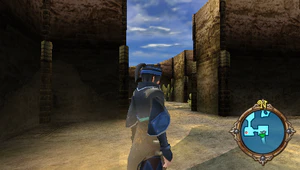Peft Ruins: Difference between revisions
More actions
Created page with "{{Location |name=Peft Ruins |japanese_name=ペフトの廃墟 |romaji_name=Pefuto no Haikyo |image=Peft Ruins.png |type=Ruins |nation=Holy Empire of Ionia<br>''(claimed, d..." |
mNo edit summary |
||
| (9 intermediate revisions by the same user not shown) | |||
| Line 1: | Line 1: | ||
{{Location | {{Location | ||
|name=Peft Ruins | |name=Peft Ruins | ||
| | |jpname=ペフトの廃墟 | ||
| | |roname=Pefuto no Haikyo | ||
|image=Peft Ruins.png | |image=Peft Ruins.png | ||
|type=Ruins | |type=Ruins | ||
|nation=[[Holy Empire of Ionia]]<br>''(claimed, de facto independent)'' | |nation=[[Holy Empire of Ionia]]<br>''(claimed, de facto independent)'' | ||
| | |HT=yes | ||
}}The '''Peft Ruins''' (ペフトの廃墟, ''Pefuto no Haikyo'') are a location in [[Genso Suikoden Tsumugareshi Hyakunen no Toki]]. They are the ruins of a former desert settlement in the [[Apiro Desert]]. | }}The '''Peft Ruins''' (ペフトの廃墟, ''Pefuto no Haikyo'') are a location in [[Genso Suikoden Tsumugareshi Hyakunen no Toki]]. They are the ruins of a former desert settlement in the [[Apiro Desert]]. | ||
| Line 12: | Line 12: | ||
Peft was once a permanent settlement based around the [[Bayan Oasis]]. However, decades ago, when changes in climate moved the oasis further south, Peft was quickly abandoned and became a miserable ruin with half-collapsed buildings standing like tombs. | Peft was once a permanent settlement based around the [[Bayan Oasis]]. However, decades ago, when changes in climate moved the oasis further south, Peft was quickly abandoned and became a miserable ruin with half-collapsed buildings standing like tombs. | ||
There are also records of ninjutsu training taking place in the ruins of Peft decades ago, under the guidance of [[Kersius]], known as the founder of Ionian-style ninjutsu. Both [[Regius]] and [[ | There are also records of ninjutsu training taking place in the ruins of Peft decades ago, under the guidance of [[Kersius]], known as the founder of Ionian-style ninjutsu. Both [[Regius]] and [[Guilleriga]] could benefit from his technique after discovering his tools in the ruins. | ||
In HIY 300, meetings between [[Rochelle Kollek]] and Ionian agents took place in these ruins. The [[Vermilion Axe]] also met the Company at these ruins, [[Aaron Barcai]] hoping to forge an alliance to march on the [[Great Wall of Achlites]] but in vain. | In HIY 300, meetings between [[Rochelle Kollek]] and Ionian agents took place in these ruins. The [[Vermilion Axe]] also met the Company at these ruins, [[Aaron Barcai]] hoping to forge an alliance to march on the [[Great Wall of Achlites]] but in vain. | ||
==References== | ==References== | ||
# [[Genso Suikoden Tsumugareshi Hyakunen no Toki The Complete Guide]] (ISBN 978-4-04-886462-6), page | # [[Genso Suikoden Tsumugareshi Hyakunen no Toki The Complete Guide]] (ISBN 978-4-04-886462-6), page 103 | ||
{{ | {{Navbox HT locations}}{{Fan Translation|locations}}{{short description|Village ruins in the Apiro Desert}} | ||
Latest revision as of 21:27, 8 October 2025
The Peft Ruins (ペフトの廃墟, Pefuto no Haikyo) are a location in Genso Suikoden Tsumugareshi Hyakunen no Toki. They are the ruins of a former desert settlement in the Apiro Desert.
Information
Peft was once a permanent settlement based around the Bayan Oasis. However, decades ago, when changes in climate moved the oasis further south, Peft was quickly abandoned and became a miserable ruin with half-collapsed buildings standing like tombs.
There are also records of ninjutsu training taking place in the ruins of Peft decades ago, under the guidance of Kersius, known as the founder of Ionian-style ninjutsu. Both Regius and Guilleriga could benefit from his technique after discovering his tools in the ruins.
In HIY 300, meetings between Rochelle Kollek and Ionian agents took place in these ruins. The Vermilion Axe also met the Company at these ruins, Aaron Barcai hoping to forge an alliance to march on the Great Wall of Achlites but in vain.
References
- Genso Suikoden Tsumugareshi Hyakunen no Toki The Complete Guide (ISBN 978-4-04-886462-6), page 103


